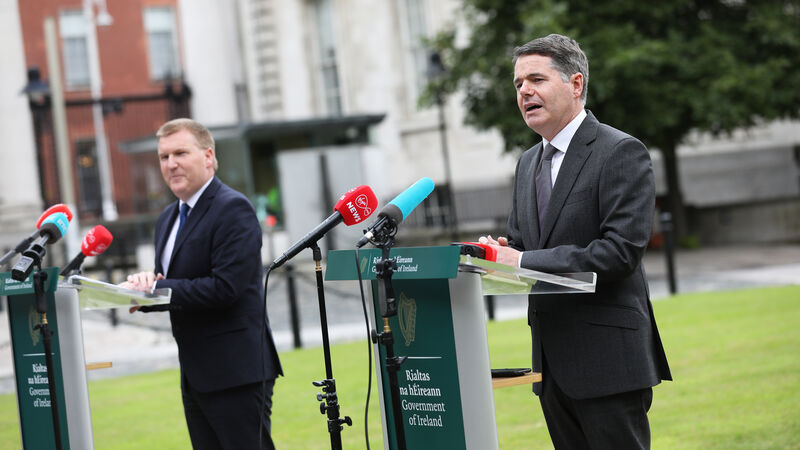Ratings agency Fitch confident Ireland's deficit can be unwound

Fitch said the coalition's Programme means fiscal consolidation will be gradual and contingent on the recovery. Picture: Julian Behal
Confidence that the impact of the pandemic on Ireland's public finances will be gradually unwound as the health crisis subsides means the outlook for the country remains stable, according to analysts from Fitch.
The ratings agency has maintained its A+ rating for the country, stating that the finances are underpinned by strong institutions and income per capita that is among the highest in the 'A' category, even after adjusting for the large impact of multinational enterprises (MNE) on national accounts data.
"Ireland's governance and human development indicators compare favourably with both 'AA' and 'A' medians," Fitch said in their analysis. "These factors are balanced by elevated levels of public debt, and external risks such as the uncertainties around the impact of Brexit and potential shifts in international policies on corporate taxation."
However, the analysis points out that the sharp decline in economic activity due to the lockdown and other restrictions to prevent the spread of Covid-19 and Government measures to support the economy will result in a substantial deterioration in the Government balance.
"Fitch expects this to swing from a 0.4% of GDP surplus in 2019 to an 8.6% of GDP deficit this year, despite some recent resilience in tax revenues."
"Department of Finance estimates indicate that direct Government support for the economy amounts to €20.5 billion (around 6.3% of forecast 2020 GDP). We expect the deficit to narrow to 4.9% next year and 2.8% in 2022. The extent to which the deficit will narrow is uncertain, depending on both the pace of economic recovery, and also the policy stance adopted by the Government in the autumn budget."
The update from Fitch mirrors similar analysis by other rating agencies. Earlier this month Moody's said the State’s finances are supported by the strengths of the economy but high debt levels, Brexit, and potential global changes to multinational corporate taxes present “challenges”.
The country’s credit-worthiness is “supported by a prudent policy framework that should yield — after the coronavirus crisis has faded — a reduction in public debt, albeit at a slower pace than pre-crisis as the Government is shifting its focus to raising public investment in infrastructure and housing”, it said.
“At the same time, Brexit remains a significant downside risk, as is the potential impact of the global corporate tax reform which could affect new investment by multinational corporations in Ireland,” Moody’s said. “At this point, we expect the impact of the coronavirus outbreak on growth and fiscal metrics to be transitory."
Fitch said the new coalition Government's programme suggests that the process of fiscal consolidation will be gradual and contingent on the recovery in the economy and the labour market.
"A balanced current budget (ie excluding public investment) will be an intermediate step, with progress towards a 'broadly balanced budget' targeted as the employment rate rises," the analysis said.
"Overall, we expect a fall in real GDP of 8.6% this year. We then expect economic activity to recover at a sustained pace next year, with real GDP rising by 6% over 2021. The pace of recovery will depend on how fast firms' and household sentiment recovers, which is very uncertain. The impact of the current crisis on the labour market will affect the latter."
"Take-up of Government support schemes suggest a sharp rise in unemployment in 2Q 2020, with Central Statistics Office estimates indicating that the underlying unemployment rate surpassed 23.1% at the end of 2Q 2020."
Fitch also said the large Irish banks appeared well placed at the start of the year to face the impact of the pandemic, given sound capital and liquidity profiles.
The various rating agencies point to uncertainty over Brexit as a risk factor for Ireland. Fitch said progress on negotiations over a possible Free Trade Agreement has seemingly been slow, and there is a significant risk that UK-EU trade reverts to WTO terms. "This would have an adverse impact on economic developments in Ireland, given its close trade links with the UK."





